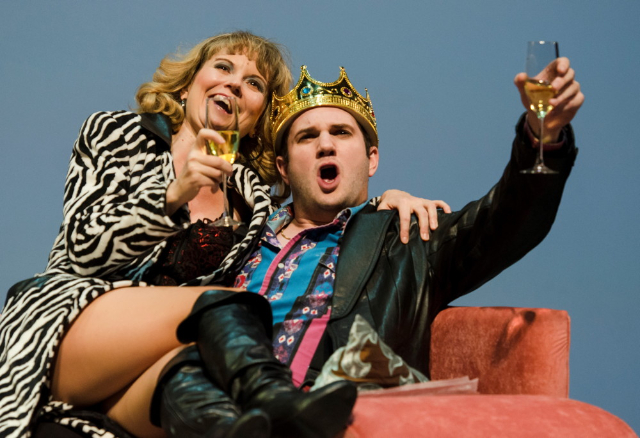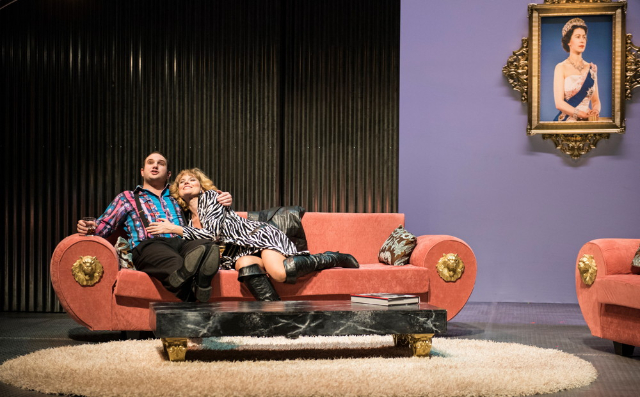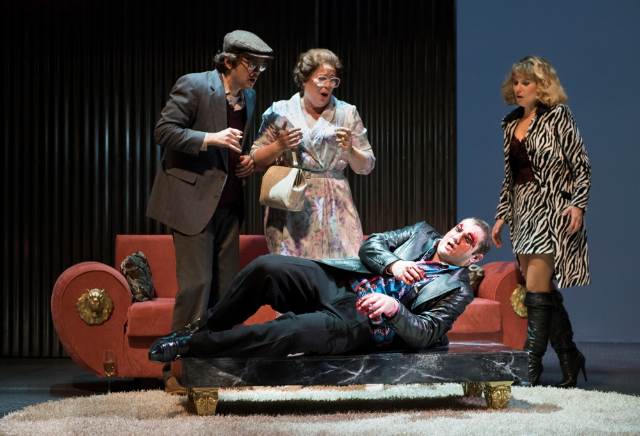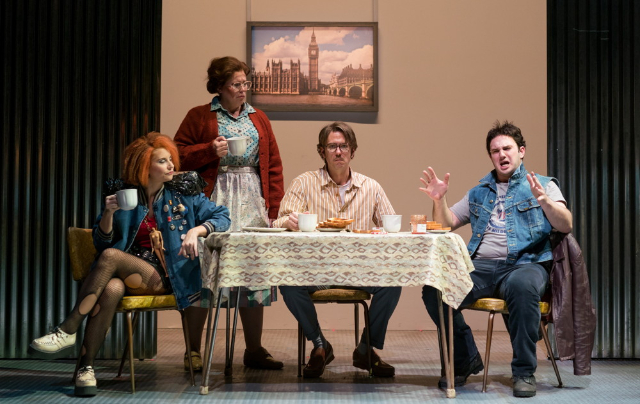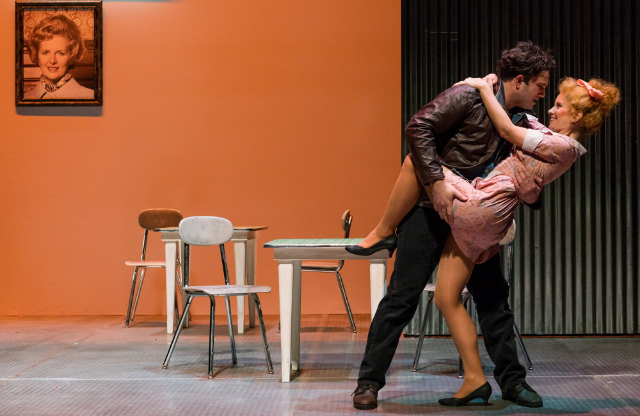Boston Lyric Opera Does Turnage's Greek
Retelling of Oedipus Rex OK's Incest
By: David Bonetti - Nov 23, 2016
“Greek”
Music by Mark-Anthony Turnage
Libretto adapted by Turnage from a play by Steven Berkoff itself adapted from Sophocles’s “Oedipus Rex”
Conductor, Andrew Bisantz
Director, Sam Helfrich
Set designer, John Conklin
Costume designer, Nancy Leary
Lighting designer, Chris Hudacs
Cast: Marcus Farnsworth, baritone; Eddy; Caroline Worra, soprano; Eddy’s Mum, Waitress, Sphinx Amanda Crider mezzo-soprano; Eddy’s sister, Waitress who becomes Eddy’s wife, Sphinx Christopher Burchett, baritone; Eddy’s Dad, Café Manager, Chief of Police
Actors: Dani Berkowitz, Erin Eva Butcher, Caleb Cedrone, Nile Hawver
Boston Lyric Opera Annex
Emerson/Paramount Center
November 16, 17, 19, 20
For the past few months if you picked up a local newspaper or magazine or even glanced at the side of a bus in Boston you couldn’t fail to notice the image of a black leather-jacketed young man looking straight out at you screaming like one of Francis Bacon’s Popes. It was an ad for the Boston Lyric Opera’s annual Annex production, this year of Mark-Anthony Turnage’s “Greek,” a punky adaptation of Sophocles’s famous tale of a man who kills his father and marries his mother, later putting out his eyes in atonement. You’d scream, too.
The man in the ad was Marcus Farnsworth, the singer who plays Oedipus, here colloquially renamed Eddy. On stage he was neither as sexy or menacing as he was in the ad, but he was sexy and menacing enough to help make the operatic adaptation of one of Western Civ’s classics work. Despite the cheekiness of the rewritten and updated text, set in working class Britain during the age of Thatcher, this is an opera that depends on its performers for its success, and the BLO cast its four principals, three of them playing multiple roles, well. But we’re getting ahead of ourselves.
“Greek” was a popular outrage when it premiered in 1988 in Munich, its characters vulgar, its language raunchy, its action violent, only the violence consistent with the original. The contrast is underscored at the Paramount before the opera begins by the projection of a video of Tyrone Guthrie’s 1952 production of William Butler Yeats’s adaptation of the Greek original. Stuffy, stilted, hieratic in style, it exemplifies a bloated theatrical tradition crying out for renewal – all those plummy accents! Calling Laurence Olivier!! Turnage’s updating answered that need, and from Munich it went to the Edinburgh Festival, where it was a serious hit, establishing the young Turnage as the bad boy of English opera, a role he has cultivated. His most recent opera, “Anna Nicole,” which premiered at, of all places, the Royal Opera House, Covent Garden, was an apparently sympathetic portrait of Texas adventuress Anna Nicole Smith; the first line of her entrance aria, “I want to blow you.”
In “Greek,” which he composed in his mid-20s, Turnage stays close to his source material until the final crucial scene. (Eddy’s Mum and Dad intone the line, “Fate makes us play the roles we’re cast.”) The change in time, language and social milieu is just style, interior decoration, although the total vulgarity of the central characters and their culture undercut the intensity of the tragedy. (Incest, of course, remains incest.) Maybe the point is that tragedy in the Greek sense is impossible in such a tawdry place as Thatcherite Britain – or Trumpian America.
Eddy is the child of working class parents, his father a virulent racist – he has a vivid moment, spouting an angry arietta about sending all the darkies back where they came from. (Sound familiar?) Eddy leaves the claustrophobic family home to seek his fortune, rather like the rake in Hogarth’s print series, “The Rake’s Progress,” which Igor Stravinsky used as the basis of his opera of the same name, which the BLO will be presenting, perhaps not coincidentally, in March. Eddy does eventually prosper as is shown in the second act, set ten years after the first, but on the way to middle class bliss, complete with a hideous pink sofa and easy chair combo, a growing paunch and a wife with faux-leopard skin shorts and top, he kills a man – her husband! – and remains estranged from whom he believes to be his parents.
The production by John Conklin was a big plus of the show. The BLO’s regular go-to guy for unifying concepts and set designs, Conklin has been up and down in his work for the BLO. His concept of setting “The Magic Flute” in the Yucatan as a fever-dream of Tamino after he is bitten by the venomous dragon he slays in the opening act was deeply misguided. But his re-setting of “La Bohème” in 1968 Paris, using videos and Situationist-style posters as décor struck me as inspired. (Others were not enthralled.)
Here, Conklin stayed close to his source, not Sophocles but Turnage, capturing the total tackiness of the British lower classes with such authority that it comes as a surprise to find out he was born in Hartford. Conklin set the action at the front of the stage in front of a wall of corrugated metal, which opened when necessary to reveal the scene of the moment: Eddy’s home, the café where he murders the café owner and immediately shacks up with his wife, the naff living room he and she have created when they prosper during the Thatcher revolution. In each scene, an iconic image hangs on the wall: the Houses of Parliament and Big Ben at home, Margaret Thatcher in all her glory in the cafe, her hair a bad interpretation of what every Milanese or Budapest housewife knows how to do naturally, and finally in faux-luxury at home, the Old Queen herself, her hair-do only a step up from her Prime Minister’s. Costume designer Nancy Leary also deserves a shout-out: she got all the hideous outfits right - gray, beige and baggy for the ‘rents and ghastly vulgar for the nouveau riche Mr. and Mrs. Eddy. And while we’re giving credits, stage director Sam Helfrich kept the action going with almost balletic grace.
Conklin returned to his use of vintage video from “Bohème” here – the time is only a decade or so later. Footage of the piles of garbage lining London’s streets, the Brixton riots and punk rockers and their fans flood the supertitle screen to remind you of the time if you’ve forgotten or if you were born after those riveting events, another moment when the established world was falling apart.
(An expression of frustration: I really appreciated the Conklin/Leary/Helfrich production, both its conception and realization, but I didn’t experience it optimally. From my seat in the balcony, the sound was good, but the stage action was obscured by mechanical scafolding projected from the balcony’s underside, and the steep angle of vision was not ideal for appreciating what I imagine were beautiful stage-pictures. And the head of conductor Andrew Bisantz was cut off at the shoulders by the supertitle screen – the orchestra was seated above the action, visually at balcony level. Not a great seat at all.)
The steeped-in-time quality of the production and of the opera also points out its datedness. “Greek” was a provocation at its premiere in 1988, but that’s nearly 30 year ago. How long can a provocation remain fresh? While it was shocking in 1988 to hear a character speak/sing the word “cunt” on stage, in 2016 when a man who went on to be elected American President bragged about grabbing women’s “pussies” played in many if not most American homes, it doesn’t pack the same linguistic wallop. The BLO was “lucky” that its production of this period piece opened just a week after our recent election when many of the issues it addresses are current, alas, again. Two years ago, during the bland Obama/Cameron/Merkel years it would have had less contemporary resonance, but the emergence of Donald Trump and his troops, not to mention Brexit, have changed the political and cultural landscape, making “Greek” relevant again, even as a glance back at a benighted time. (And as for incest, we have the Donald and Ivanka – did you see the video of him groping her bod and grabbing her ass?)
Opera, of course, is about music, but in this case, music takes a back seat to theater. Turnage’s score is that of a young man absorbing the avant-garde of the time before his own – Stravinsky, thank god not Britten. It is abrasive, jagged in its rhythms and above all percussive. (The score calls for dozens of percussion instruments but no violins. There are only five string instruments in all, three cellos, one viola and one harp.) There are nods toward both the jazz and blues traditions. But the punk music of its era is strangely muted. (In general, conservatory trained composers are too timid to my thinking in invoking the popular music of their era.) The score does make quite a racket, especially in the violent scenes - maybe that’s its acknowledgment of its punkish moment. Turnage, using a play by Steven Berkoff as his source, also writes compelling, almost lyrical music for the love scene between Eddy and his wife, which comes immediately upon his killing her husband – must not have been a good marriage.
As noted above, the performers formed a cohesive and vocally excellent unit. Most of the text was recited rather than sung, but the cast was musically adept. As Eddy, Farnsworth was excellent as both actor and singer, his rich baritone capable of both violent spoken utterances and lyrical singing. In the multiple roles of his Mum, a waitress and the Sphinx, soprano Catherine Worra, a veteran BLO singer was in fine form, able to play both the frumpy Mum in her dowdy cardigan and, stripped to her brassiere and slip, the seductive Sphinx, with tonal allure. As Dad and the Café owner, baritone Christopher Burchett, did the most he could with a smaller role. The find was BLO debutante, mezzo-soprano Amanda Crider, who as Eddy’s sister and later Eddy’s wife – talk about incest! – and the Sphinx, nailed her roles with a light and flexible mezzo voice. Let’s hear her here again!
BTW, the scene of the Sphinx, Worra and Crider sharing the role, stretched out on opposite ends of an extended divan, bathed in pink lights, was one of the most striking in the work.
The orchestra, 18 intrepid players, most called upon as percussionists even if their instrument of choice was a cello or a saxophone, created a vibrant sound-world for this dystopian drama. Conductor Andrew Bisantz kept it all together, even if I couldn’t see his head.
Oh, yeah, at the end, after he’s pulled out his eyes, Eddy decides that incest isn’t so bad a crime after all, is it, returns from the dead and hooks up with his real Mum/wife again. OK. Whatever.

